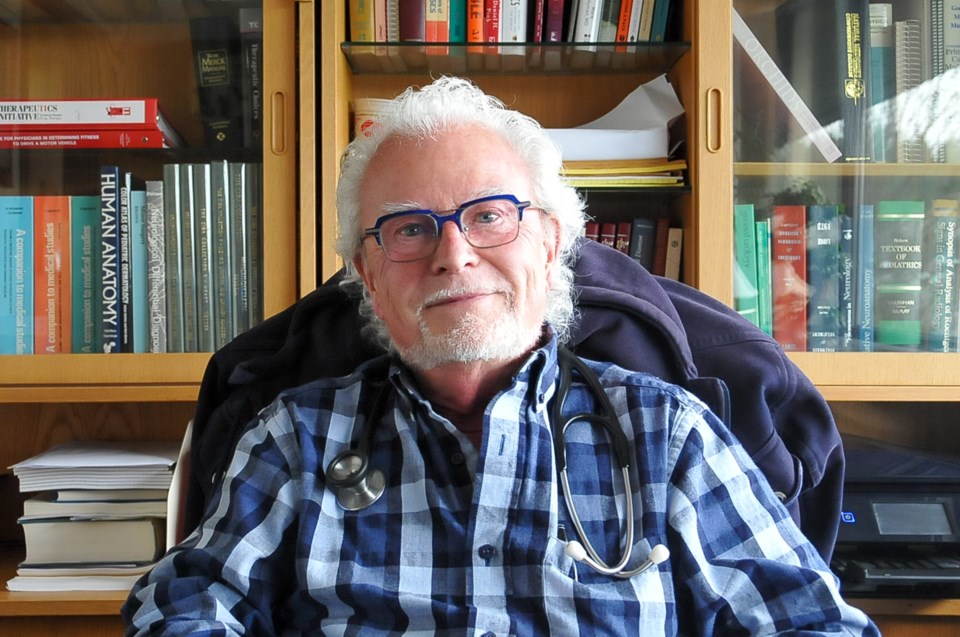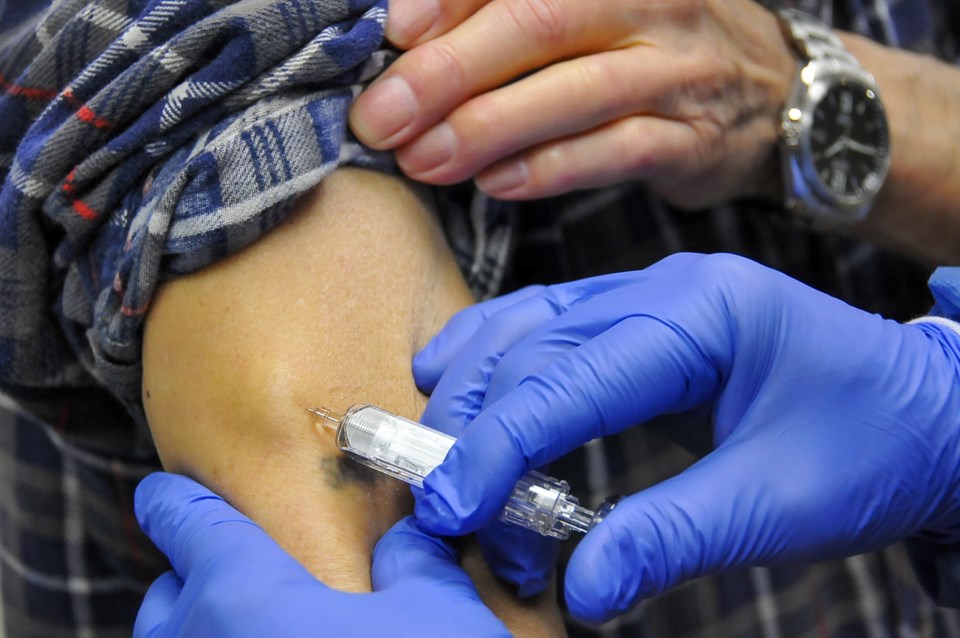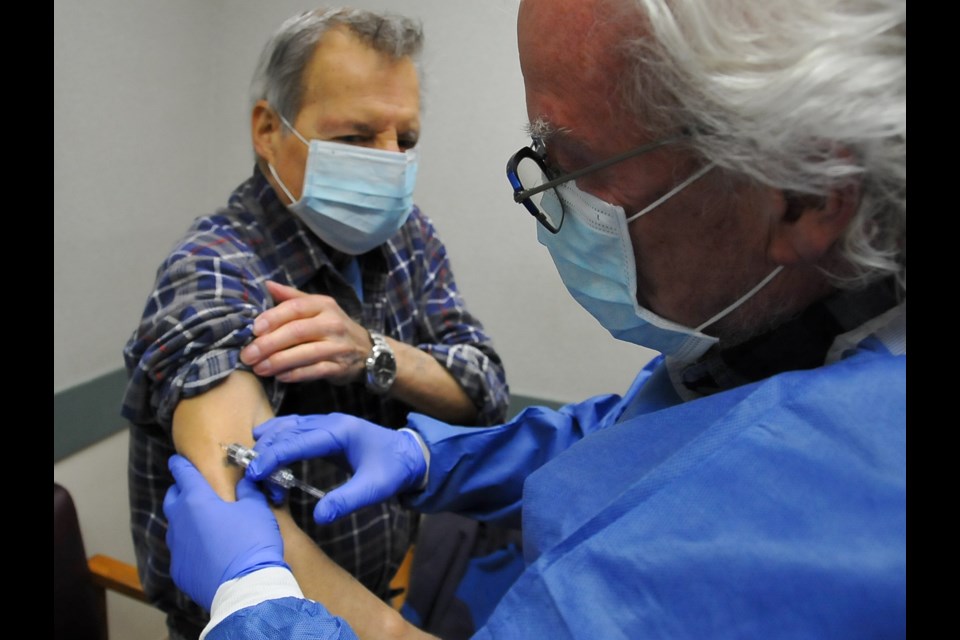Ray Croteau is a pandemic regular at the clinic, but he’s got no choice.
Without a weekly visit to the Burke Mountain Medical Centre in Port Coquitlam, he wouldn’t have his shot to stimulate the production of red blood cells through his body and help him get through another day.
“We started four months ago. Before, he couldn’t walk across the living room,” said Croteau’s doctor, Ian Woods, as the senior rolled up his sleeve inside an exam room.
The Port Coquitlam man suffers from a chronic bone marrow disease that requires constant attention by a physician.
For Croteau, like many of the ill and injured across the Tri-Cities, the coronavirus has squeezed access to primary care. Family clinics have been forced to shutter their doors for lack of masks, gloves and gowns, and hospital emergency rooms have urged only the most acutely sick and injured to come through their doors to minimize potential exposure to the virus.
In an effort to fill that breach, last week, practices across the Tri-Cities coordinated through the Fraser Northwest Division of Family Practice (FNWD) to designate the Burke Mountain Medical Centre as a clearinghouse for patients who can’t see their doctor, or for others who never had one to start with.
“This is the pandemic solution,” said Woods, who’s the senior physician at the clinic.
When, in January, Woods first starting hearing about a strange new respiratory virus in Wuhan, China, he immediately remembered thinking: “This is going to be a problem.”
Soon, he began getting calls from patients who had just returned from trips to India with severe coughs and fevers.
“Emerg said not to come in. The walk-in clinics told them to go away,” said Woods.
Then Italy got hit and Woods started talking with FNWD to find a solution for patients sick with anything but COVID-19.
By April 20 the new family medicine hub was set up at the clinic parallel to its normal work. Stocked with personal protective equipment, it now takes on non-COVID patients who otherwise could slip through the cracks of a strained medical system.
“There are thousands of patients in the whole Tri-Cities that have no physicians and have nowhere to go right now. And we don’t want them to go to emerg,” said Woods.

Each of the doctors has added several hours a day to their regular shifts to see new patients.
Patients are first screened by a COVID-19 online testing tool set up by FNWD. If after a virtual visit with a doctor, it’s deemed necessary to follow up face-to-face, they’re either transferred to a coronavirus testing facility, or they make their way to see one of the six doctors at the Burke Mountain Medical Clinic.
“We don’t just want people walking in. It’s too risky,” said Woods.
Any error in diagnosing a patient COVID-free falls back on the Tri-City physician who made the initial referral, so there’s a lot of incentive to be hyper-vigilant, added Woods.
Still, COVID-19 patients don’t always exhibit textbook symptoms, and so the Port Coquitlam clinic is working on the presumption that any patient could be infected with the virus.
Patients arrive on a staggered schedule to minimize contact with one another, a physical distancing measure made easier by the fact the shuttered dentist and physiotherapist offices are on the floor. Inside, a plexiglass barrier installed six weeks ago separates patients and the receptionists, who have also been working extra shifts to cover the increased patient load and extended hours.
“We learned from Italy,” said Woods. “They didn’t have this protocol in place. Guys who were doing what I’m doing are dead in Italy.”
From Monday to Friday, the clinic remains open for 12 hours a day, with staff putting in another six hours a day on Saturdays and Sundays.
“It’s like running two clinics at the same time,” said Woods.
Beyond the regular staff, the Port Coquitlam clinic has an extra nurse on-site and has so far received a steady supply of masks, gloves, gowns and face shields from FNWD.
“It’s tight. There’s not a lot of equipment around. At the moment we’re okay, but if we get a lot busier, hopefully, we won’t run out.”
Each doctor can see up to 50 patients a day, though a large share of those are now done online through virtual Telehealth consultations that have ramped up across all areas of primary medicine since the COVID-19 outbreak began.
Doctors at the clinic see a range of patients, from young children to seniors. Some come in with strep throat, after a traumatic fall or just to check their blood pressure.
But at least half are like Croteau, said Woods, with long-standing medical conditions like prostate cancer, hyperthyroidism or are recovering from alcohol or drug addictions. Woven through all of the patients looms depression.
“A lot of them are manifesting serious psychological distress. Their disease is accelerated by isolation and there’s no end in sight for them,” said Woods.
Woods worries that the general population is getting restless at home, and that self-isolation is starting to hit them. For those who’s baseline is living with chronic pain or the symptoms of a debilitating disease, the isolation can be nearly unbearable.
“If you got a complex disease, this almost acts as a tipping point,” said Woods. “They say, ‘Doc, what am I going to do?’”

Inside the exam room, Woods and Croteau chatted about family as the doctor prepared the needle. The Port Coquitlam resident said he’s lucky he has his wife to take care of him and keep him company while in isolation, and his adult children regularly come by to drop off groceries at the front door.
Still, trips to the doctor have become Croteau’s outing, his only contact with another person outside of the home and a vital medical link to keep his energy and spirits up.
Whether through online video check-ins or in-person consultations, Woods said he and other working family physicians have become an increasingly important part of patients’ social life as they try to offer them some "light at the end of the tunnel.”
And while Woods is cautiously optimistic about the falling daily caseload across the province, he has no illusions about the potential for a second or third wave of the virus to ripple through the population between now and when someone develops a vaccine. Until then, Woods and the other five doctors at the clinic said they’re ready to help fill the gap between emergency and no medicine at all.
“We can go on as long as it’s needed,” said Woods. “To me, that’s why we’re in medicine… You shouldn’t just be in it for the good times. You need to be here for the bad, too.”



